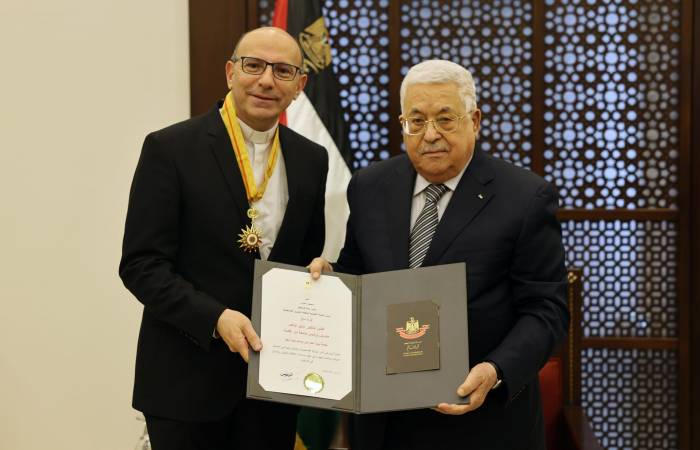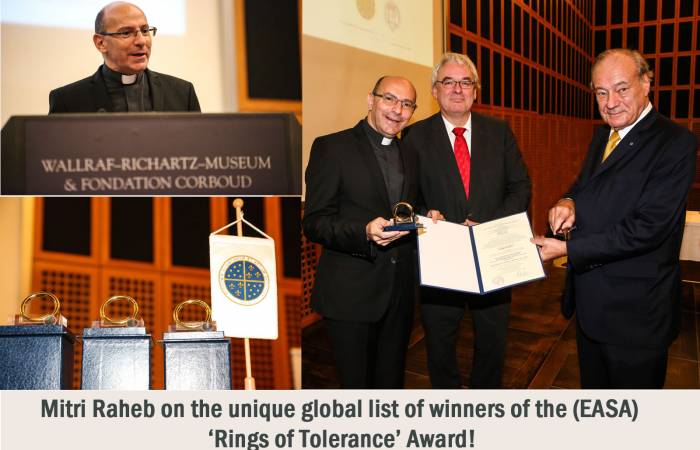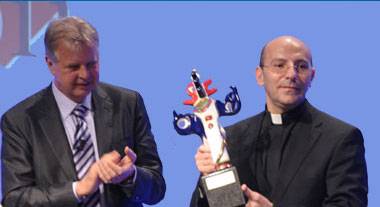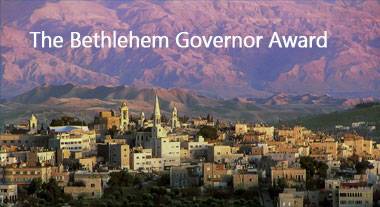Olaf Palme Prize
Olaf Palme Prize for “his innovative artistic education in film, art, and drama, Raheb has made it possible for young people to investigate their Palestinian identity, to nurture beauty, and to invest in a culture of life as tools for a creative resistance against suffocating confinement and towards nation building.”

Olof Palme Prize Ceremony
Rev. Dr. Mitri Raheb
Stockholm, Swedish Parlaiment
January 29th, 2016
Dear Ms. Lisbeth Palme, thank you for your kind and powerful words.
Your excellencies; dear friends, ladies and gentlemen,
It is truly an honor to be with you on this day receiving the Olof Palme Prize. I have received in the past several prestigious awards, but this one is special to my heart. It is very unique because it carries the name of Olof Palme, one of the most courageous political leaders in the second half of the 20th century, who dared to stand up in the face of empire; a visionary leader, who knew that apartheid should not be tolerated, and that the cry for liberation in many countries in the global south should be heard and supported.
It is with joy that I receive this prize here in Sweden; a country that has been all along a defender of human rights and international law, a fact that was proven lately by recognizing the state of Palestine, which shows that its government is serious about international law and does not tolerate double standards. Since 2008, the Olof Palme International Center has been a strategic partner supporting us in training future leaders in Palestine and equipping them to be active citizens in the society. This prize is the crowning of this partnership. And I am glad to share this prize with Gideon Levi, one of most articulate journalists and a courageous prophetic voice in Israel today.
Your Excellencies,
Next year Palestine will be commemorating the 100th anniversary of the Balfour Declaration, when the British Empire gave away our land for colonization. The year 2017 marks also the 50th anniversary of the occupation of the West Bank, the Gaza Strip, and the Golan Heights. I was five years old when I saw the Israeli soldiers marching in the little town of Bethlehem. In all of these years I was experiencing what the Israeli Occupation does to our community, I could see how the whole West Bank started looking more and more like a piece of Swiss cheese where Israel gets the cheese, the land and its resources, and the Palestinians are pushed in the holes. I witness this in my own hometown Bethlehem, where 86% of our land is not under our control, but being colonized by Israeli settlers who keep exploiting our resources, stones, water, and minerals. I follow the building of the Separation Wall, which continues to be constructed as we speak in the Cremisan Valley, not on the green line but in the backyard of the farthest home in town preventing our city from expansion. As a pastor I see how this Occupation is destroying the fabric of our society: a city that cannot expand, is doomed to die; without possibilities for expansion with new neighborhoods, we cannot do any reasonable city planning. The little town is losing its character. Without possibilities for expansion and the freedom of movement, unemployment will continue to rise, and as such we will have more social tensions, more crimes; and with crime comes drugs and violence. This is not a natural catastrophe that comes from heaven, but a man-made adversity and a systematically-planned one that is subsidized partly by the international community.
As a pastor who lives in the little town, I keep asking myself: how will our people survive, physically, socially, economically, and spiritually? How can I preach the good news for people who wake everyday just to hear another bad news? The continuing Occupation denies us our freedom and the right to exercise our self-determination. It de-humanizes our people. The Occupation does not steal only our land, but also our future and that of our children; it robs our kids from being able to live in dignity and prosperity. The Occupation is destroying our souls as Palestinians and the souls of the Israelis too.
But we are not only denied our political and economic rights, but also our cultural and religious rights: we are denied the right to have our own narrative that stands on its own; the right to tell our story the way we experience it; the right to read the Bible with our own eyes and not always with an Eurocentric post-Holocaust lens. A major problem in the Middle East today are those groups who appoint themselves as god's judges on earth: they think they have the right to say who is Kafer (infidel) and who is not, who is kosher and who is not. In the name of divine rights they deny us equal human rights. These are not only Islamist groups in Iraq and Syria, but also Jewish groups in Israel who have been lately attacking churches and monasteries. But there are also Christian Zionists, and you have some of them here, who keep attacking fellow Christians who dare to challenge the Israeli Occupation. They want to silence our voices. They want us to believe that the Occupation is God’s gift to us, and that the land grab that we are experiencing is the fulfillment of God's promises. As a Christian theologian, I have to say that is it not acceptable to violate human rights in the name of divine rights, or to play God against the humans. Groups who do that are mis-using the scriptures for their own political ideologies and they are not much different than ISIS. The scriptures and the Human Rights charter are there for one and the same reason: to defend the meek, protect the rights of the weak, put limits to those in power, and to make sure that the Empire adheres to the laws. Both religion and state have to insure that the power of law and not the law of power prevails; that the power of culture and not the culture of power has the last word. No religion is entitled to give the Israelis more rights than Palestinians, Muslims more privileges than Christians, or men higher wages than women. Equality is something we cannot compromise on, and therefore we will continue to resist the concept of a religious state. Religious states corrupt both religion and the state: a Jewish state, an Islamic state, or a Christian state will discriminate by nature against part of its own citizens. The state has to treat all of its citizens based on equality. The historic step that Sweden took in the year 2000, in mutual agreement, served for a healthier relationship between the Church and the state.
We are faced with these immense challenges and the question has been all along: should we give up, should we accept our fate, should we adopt a theology that discriminates against us, or should we leave and seek asylum away from our homelands, cut from our roots? Or should we escape in a religious fundamentalism cloak, comforting ourselves that in heaven things will get better and will be much different. We chose none of the above. We chose to stay. We chose to resist, and to resist creatively. Resist through the word and by constructing our own narrative and developing a dynamic identity. We decided to stay and to commit to keep challenging the Occupation until it is dismantled. We decided to stay and to assist in building a Palestinian state that respects human rights, international treaties, and pluralism. We chose to invest; invest in infra-structure by building a brand new university and a cultural and conference center. We opted to stay and minister to our Christian community that keeps shrinking day after day. We opted to stay and train the next generation of Palestinian leaders who are capable of telling their story through art, film, dance and theater. Many of the young people in Palestine today have no problem to believe in life after death, but they cannot see life before death that is worth living. We committed ourselves to creating room for hope, so that our young people will not dream of dying for Palestine, but to live and serve their community. We wanted them to continue to believe that the sky is the limit and not the wall. We wanted them to become active citizens who are engaged in civil society and do not shy away from assuming responsibility. We committed our lives to keep hope alive, to continue preaching that peace is possible, that Israelis and Palestinians are not doomed to live in conflict for eternity, but to share the land, the resources and the future. The prize we are receiving today is a push to continue this path.
Thank you Sweden for sticking to International Law and human rights
Thank you Swedish Government for walking the talk and recognizing Palestine
Thank you Olof Palme Fund and family for keeping the course and spirit of Olof Palme alive
Thank you my family & colleagues for being such a great big family and such a strong team
Thank you friends in church and society for your continuous support and encouragement.
Your Excellencies,
I am convinced that Occupation has no future. I have no doubt that justice will come. I know that peace is possible. As dark as it may seem, we will work toward the dream until we see the beam, the light of Liberty. And we will be free, free,free.
Thank you for this honor of Olof Palme Prize.
***End of Speech***



